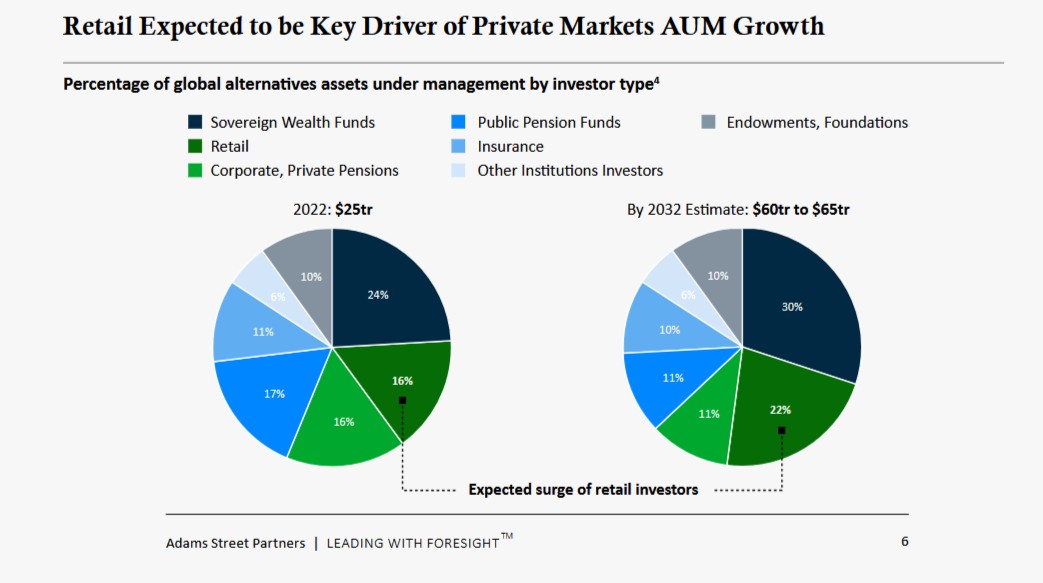Investment Strategies
Financial Advisors Lean Into Private Markets Despite Challenges

The Adams Street Partners 2025 Advisor Outlook highlights rising demand for access to private markets. A question is how far this appetite can hold up in the face of recent slides in equities and dislocations caused by the new US tariff regime.
A new report by Chicago-headquartered Adams Street Partners, a private markets investment firm with more than $62 billion in assets under management, shows that the shift towards private markets is accelerating as wealthy individuals seek diversified investment opportunities.
The report, entitled The Rise of Private Wealth in Private Markets, presents insights from over 100 financial advisors across North America, Europe, and Asia.
These are difficult times for private markets as listed equities turn volatile, accentuated by the US tariffs policy shifts. The exit routes private equity funds look for – such as initial public offerings (IPO) of companies – are arguably more difficult to execute in such times. Also, trade sales and corporate deals can be more difficult to undertake. Stocks in Blackstone, a major private equity player, fell last week and are down more than 8.5 per cent over the past month. Carlyle Group, another listed PE house, is down more than 14 per cent on the stock market, and KKR is down 9.5 per cent.
Despite this, respondents in the Adams Street survey cite growing client demand for private market exposure, with 92 per cent expecting the asset class to outperform public markets over the long term, the firm said. In turn, 67 per cent anticipate an increase in the percentage of clients with an allocation to the asset class over the next three years.
“Private markets are becoming an essential part of a well-diversified portfolio, and financial advisors are on the front lines of this shift,” said Jim Walker, partner and global head of wealth at Adams Street. “Adams Street is focused on equipping advisors with access to institutional-quality origination, education, and a range of structures to help meet client goals. As an employee-owned firm with significant assets invested alongside our clients, we are deeply aligned with those we serve.”
While complexity, limited access, and tax reporting preferences have historically limited private market participation, advisors report progress in addressing those barriers, the report shows. Structures such as semi-liquid evergreen funds and digital platforms, along with an increasingly favourable regulatory environment are expanding the reach of private investments. As a result, the wealth management market has emerged as a fast-growing source of private markets capital. Individual investors account for about $2.7 trillion, or one-fifth, of the $14 trillion in private market assets under management, according to Morgan Stanley. This is projected to rise to 37 per cent within five years, signalling a profound shift in capital flows and a growing democratisation of private markets investing.
“Individual investors are playing an increasingly vital role in the evolution of private markets,” said Jeffrey Diehl, managing partner and head of investments at Adams Street. “As access expands and product innovation accelerates, we see a meaningful opportunity to deliver differentiated returns through high-quality private equity and private credit investments strategies traditionally reserved for institutional portfolios.”
Changing slices of the pie

Source: Adams Street Partners
The report shows that evergreen structures are gaining traction, with 44 per cent of advisors preferring them to traditional closed-end funds (37 per cent). Over half cite broader client access as a primary benefit of these vehicles.
Sixty-nine per cent of advisors also believe that the complexity of private markets makes it difficult to communicate effectively with clients. Forty-nine per cent rate their own expertise as “advanced," while client understanding trails, with 32 per cent of advisors reporting that their clients have “advanced knowledge.”
Technology is seen as a key investment sector in 2025 for 58 per
cent of advisors, followed by financial services (42 per cent).
North America-based advisors report that clients prioritise
wealth preservation and tax efficiency, while those in Europe
emphasise access to new investment
opportunities. In Asia, advisors highlight private markets’
ability to drive income and diversification.
AI impact
Advisors also expect artificial intelligence to transform the way
in which they engage with clients, predicting enhancements in
risk management (52 per cent), market forecasting (48 per cent),
and operational efficiency (48 per cent).
Figures in the industry, when asked if they think the private market story is maturing, see more upside. For example, Steven Tredget, partner at UK-based Oakley Capital, also believes that the sector is far from having peaked, although the past couple of years have not been particularly easy. Blackstone, in a survey, also revealed strong advisor interest in private markets, with 81 per cent planning to introduce them to clients for objectives such as capital appreciation, income generation and diversification.
Paris and Boston-headquartered Natixis Investment Managers, which has over $1.3 trillion assets under management, also recently released a new wealth industry survey showing that 92 per cent of respondents plan to increase (50 per cent) or maintain (42 per cent) their private credit offering and similarly 91 per cent plan to increase (50 per cent) or maintain (41 per cent) private equity investments on their platforms.
Adams Street Partners, which has offices in Austin, Beijing, Boston, Chicago, London, Menlo Park, Munich, New York, Seoul, Singapore, Sydney, Tokyo, and Toronto, provides wealth managers and financial advisors access to private markets' knowledge and investment solutions designed to help their clients grow and protect wealth.
The firm, which was founded over 50 years ago, manages over $62 billion for clients across private equity and venture capital funds, secondary, growth equity, buyout and venture co-investments, and private credit strategies.